外研(新标准)版八年级上册Module 1 How to learn English Unit 3 Language in use课件(共20张PPT)
文档属性
| 名称 | 外研(新标准)版八年级上册Module 1 How to learn English Unit 3 Language in use课件(共20张PPT) | 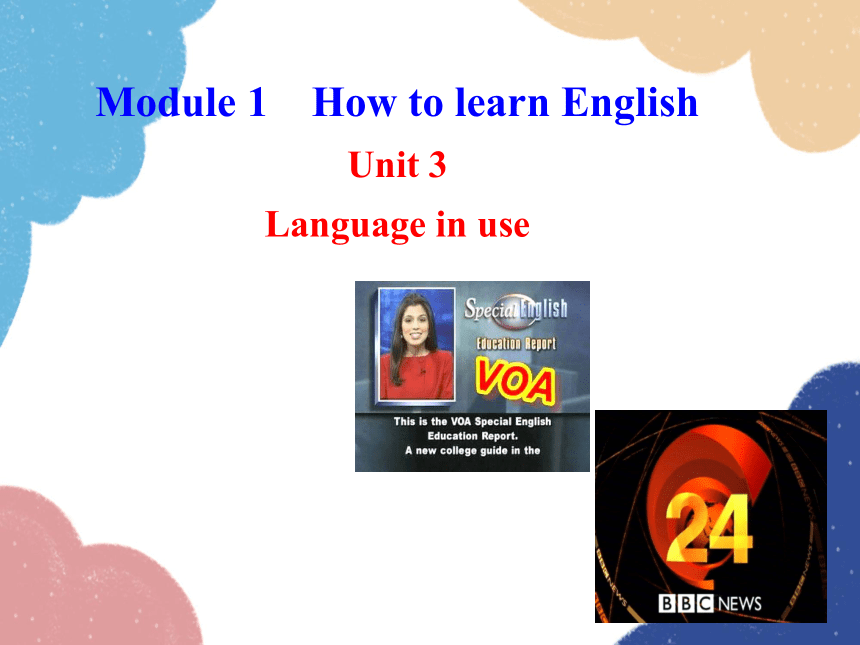 | |
| 格式 | ppt | ||
| 文件大小 | 1.2MB | ||
| 资源类型 | 教案 | ||
| 版本资源 | 外研版 | ||
| 科目 | 英语 | ||
| 更新时间 | 2022-11-24 17:14:56 | ||
图片预览


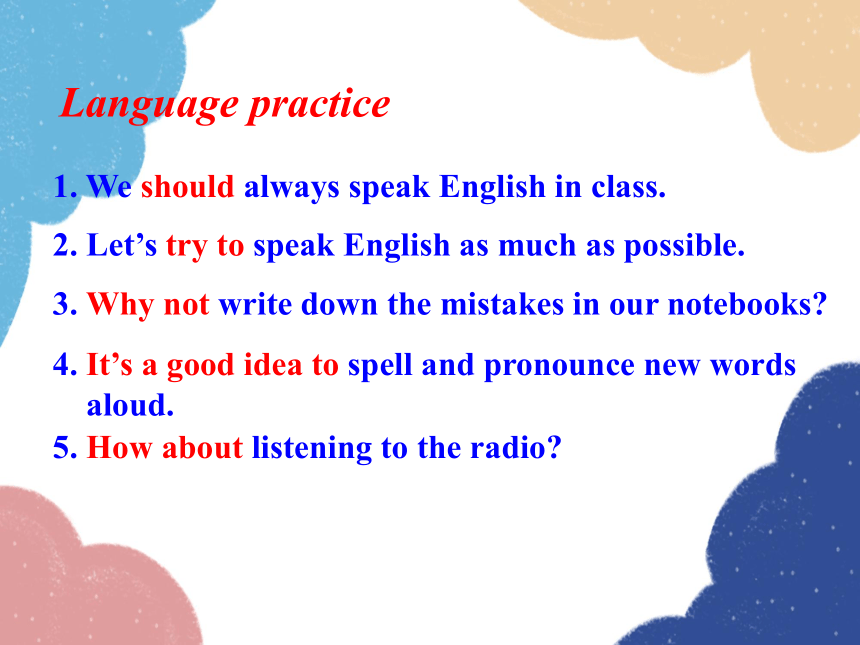

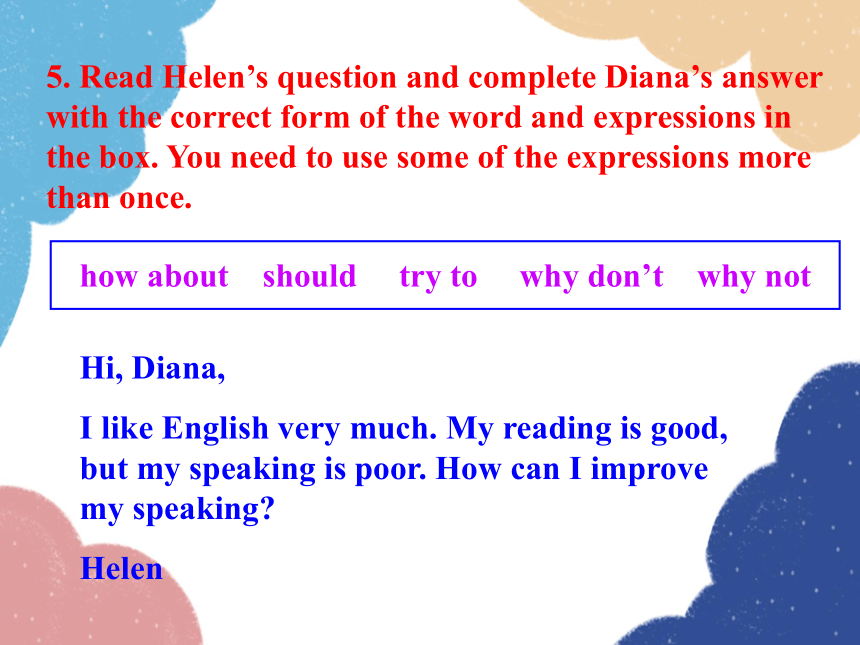
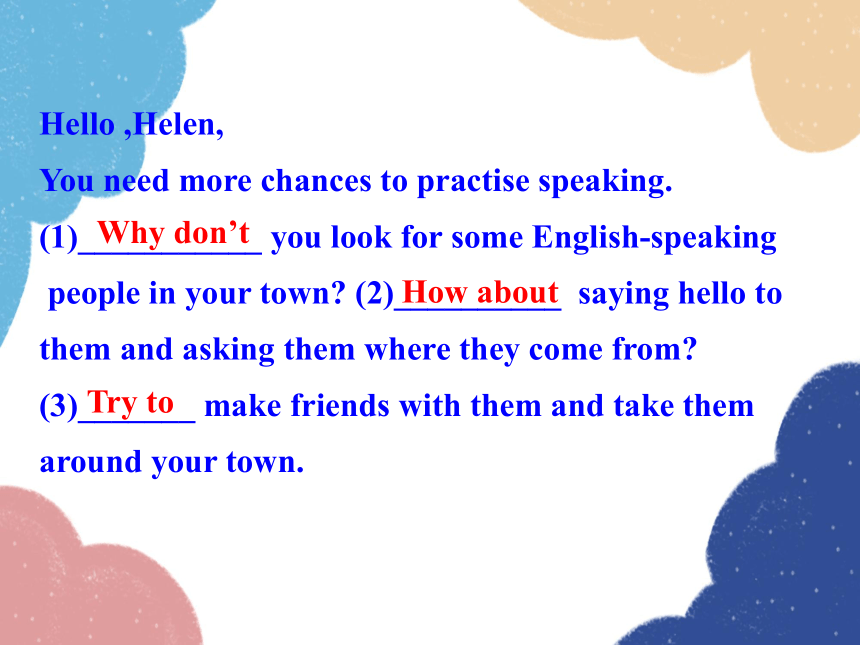
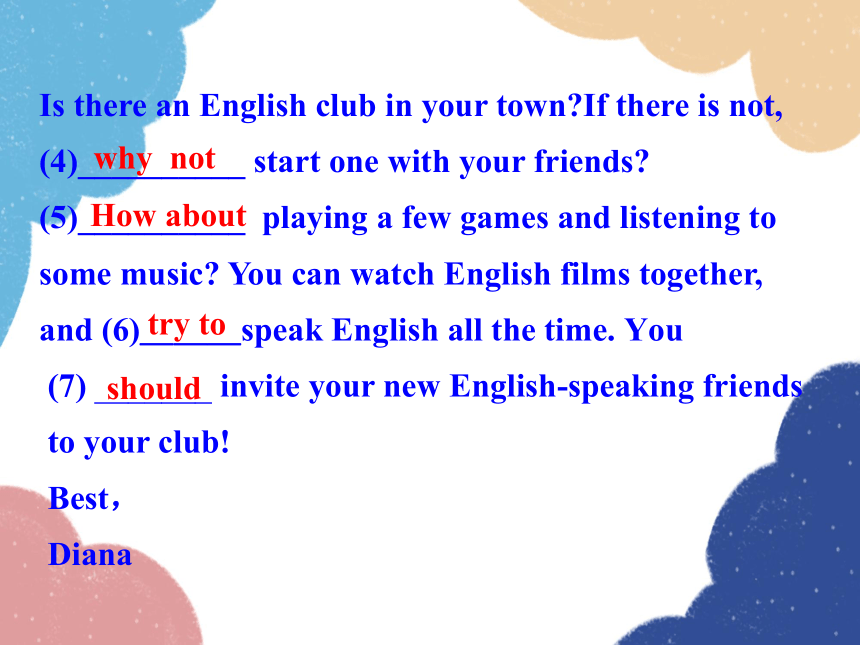
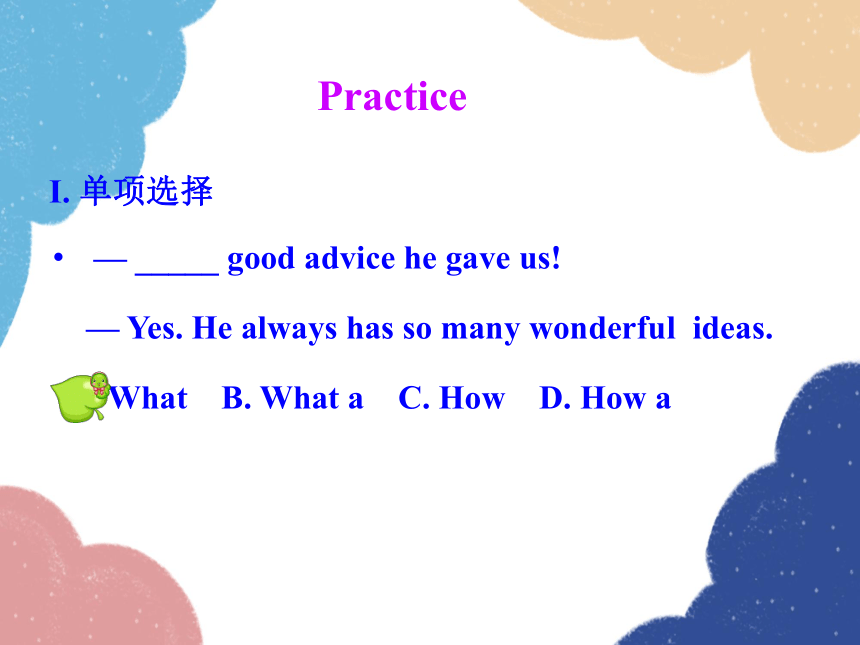
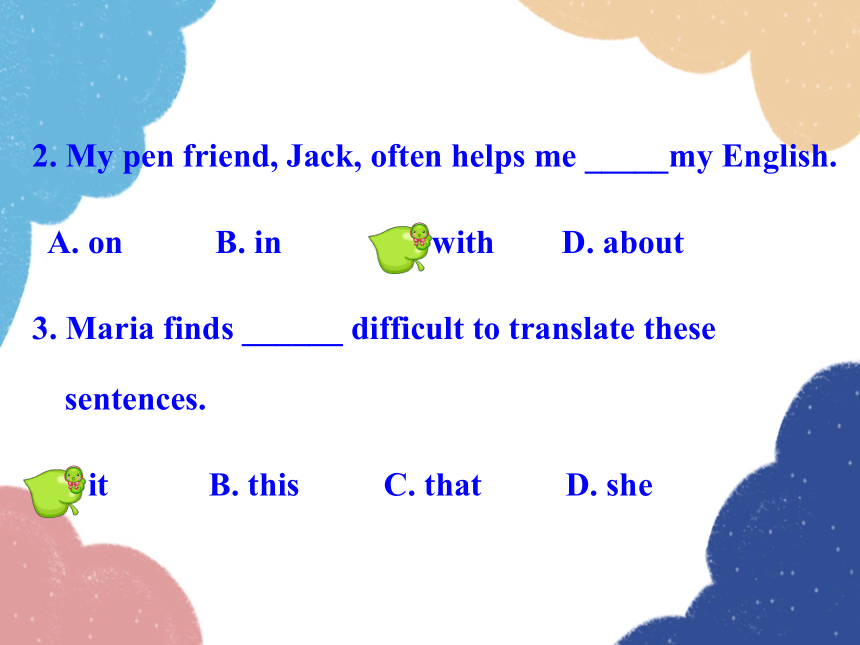
文档简介
(共20张PPT)
Module 1 How to learn English Unit 3 Language in use
提供建议的表达方式:
1. You should/shouldn’t do ….
2. What about/How about doing…?
3. Why don’t you/Why not do…?
4. Try (not) to do….
5. It’s a good idea to do….
6. Don’t forget/Remember to do....
Make sentences with the drills.
Lead-in
Language practice
1. We should always speak English in class.
2. Let’s try to speak English as much as possible.
3. Why not write down the mistakes in our notebooks
4. It’s a good idea to spell and pronounce new words
aloud.
5. How about listening to the radio
5. Read Helen’s question and complete Diana’s answer with the correct form of the word and expressions in the box. You need to use some of the expressions more than once.
how about should try to why don’t why not
Hi, Diana,
I like English very much. My reading is good, but my speaking is poor. How can I improve my speaking
Helen
Hello ,Helen,
You need more chances to practise speaking.
(1)___________ you look for some English-speaking
people in your town (2)__________ saying hello to
them and asking them where they come from
(3)_______ make friends with them and take them
around your town.
Why don’t
How about
Try to
Is there an English club in your town If there is not,
(4)__________ start one with your friends
(5)__________ playing a few games and listening to
some music You can watch English films together,
and (6)___speak English all the time. You
(7) _______ invite your new English-speaking friends
to your club!
Best,
Diana
why not
How about
try to
should
— _____ good advice he gave us!
— Yes. He always has so many wonderful ideas.
A. What B. What a C. How D. How a
I. 单项选择
Practice
2. My pen friend, Jack, often helps me _____my English.
A. on B. in C. with D. about
3. Maria finds ______ difficult to translate these sentences.
A. it B. this C. that D. she
4. — Don’t forget their addresses and telephone numbers.
— I will _____ in my notebook.
A. write them down B. write it down
C. write down it D. write down them
5. — May I ______ your dictionary
— Sorry, I ______ it at home.
A. borrow; forgot B. borrow; left
C. lend; forgot D. lend; left
6. — I’m not interested in English. It’s difficult for me to learn it well.
— Don’t worry. You will learn it well if you work harder, but it ___ time.
A. costs B. spends
C. pays D. takes
7. — How do you get on with your English
— I am ______ at grammar but I don’t do ____ in listening.
A. good; good B. good; well
C. well; good D. well; well
8. My cousin is a ______ girl. She is afraid of speaking in front of many people.
A. friendly B. polite
C. shy D. helpful
9. — Your spoken English is really ____.
— Thanks. It’s very nice of you to say so.
A. deep B. excellent
C. basic D. difficult
10. She tried ______, but she found it difficult.
A. not to worrying B. to not worry
C. not to worry D. to worry not
11. — What’s your plan for the coming weekend
— ______ go to fly kites
A. Why not to B. Why don’t
C. Why don’t we D. How about
12. —Don’t forget ______ your dictionary here tomorrow.
— OK. I won’t.
A. taking B. to take
C. bringing D. to bring
13. The boy went to the teachers’ office to _____ his teacher _____ advice about improving his maths.
A. ask; for B. talk; about
C. speak; to D. place; in
14. What he said _______ me ________ yesterday.
A. make; sad B. makes; sadly
C. made; sad D. made; sadly
15. — How about visiting the museum with me this
afternoon
— _____.
A. That’s right B. Good idea
C. Good luck D. Best wishes
II.根据句意及所给首字母提示完成单词。
1. You should make a plan for studying at the
beginning of the t____.
2. Don’t be afraid of making m_______ when you
speak English.
3. Both English and Chinese are important l________
in the world.
4. Thanks for telling me some good ways to i_______
my English.
5. Most young people like to send text m_______ to
each other.
erm
istakes
anguages
mprove
essages
Ⅲ.用括号中所给单词的适当形式填空
1. I’m afraid that your __________ (translate) is not
correct.
2. Every one should practise ________ (speak) English
every day.
3. Lu Xun is a famous writer and ________ (write) is a
part of his life.
4. Please send my best ______ (wish) to your parents.
5. You should pay attention to your ________ (spell).
translation
speaking
writing
wishes
spelling
IV. 句型转换
1.Let’s correct our mistakes. (改为同义句)
___________ ______ correcting our mistakes
2.I translated this article into English. (对画线部分提问)
______ _________ did you _________ this article into
3.Remember to lock the door. (改为同义句)
______ ______ to lock the door.
4.You should learn from Wei Hua. (改为否定句)
You _________ ________ from Wei Hua.
What/How about
What language translate
Don’t forget
shouldn’t learn
Homework
Write your own ideas about learning English well.
Where there is life , there is hope.
有生命必有希望。
Module 1 How to learn English Unit 3 Language in use
提供建议的表达方式:
1. You should/shouldn’t do ….
2. What about/How about doing…?
3. Why don’t you/Why not do…?
4. Try (not) to do….
5. It’s a good idea to do….
6. Don’t forget/Remember to do....
Make sentences with the drills.
Lead-in
Language practice
1. We should always speak English in class.
2. Let’s try to speak English as much as possible.
3. Why not write down the mistakes in our notebooks
4. It’s a good idea to spell and pronounce new words
aloud.
5. How about listening to the radio
5. Read Helen’s question and complete Diana’s answer with the correct form of the word and expressions in the box. You need to use some of the expressions more than once.
how about should try to why don’t why not
Hi, Diana,
I like English very much. My reading is good, but my speaking is poor. How can I improve my speaking
Helen
Hello ,Helen,
You need more chances to practise speaking.
(1)___________ you look for some English-speaking
people in your town (2)__________ saying hello to
them and asking them where they come from
(3)_______ make friends with them and take them
around your town.
Why don’t
How about
Try to
Is there an English club in your town If there is not,
(4)__________ start one with your friends
(5)__________ playing a few games and listening to
some music You can watch English films together,
and (6)___speak English all the time. You
(7) _______ invite your new English-speaking friends
to your club!
Best,
Diana
why not
How about
try to
should
— _____ good advice he gave us!
— Yes. He always has so many wonderful ideas.
A. What B. What a C. How D. How a
I. 单项选择
Practice
2. My pen friend, Jack, often helps me _____my English.
A. on B. in C. with D. about
3. Maria finds ______ difficult to translate these sentences.
A. it B. this C. that D. she
4. — Don’t forget their addresses and telephone numbers.
— I will _____ in my notebook.
A. write them down B. write it down
C. write down it D. write down them
5. — May I ______ your dictionary
— Sorry, I ______ it at home.
A. borrow; forgot B. borrow; left
C. lend; forgot D. lend; left
6. — I’m not interested in English. It’s difficult for me to learn it well.
— Don’t worry. You will learn it well if you work harder, but it ___ time.
A. costs B. spends
C. pays D. takes
7. — How do you get on with your English
— I am ______ at grammar but I don’t do ____ in listening.
A. good; good B. good; well
C. well; good D. well; well
8. My cousin is a ______ girl. She is afraid of speaking in front of many people.
A. friendly B. polite
C. shy D. helpful
9. — Your spoken English is really ____.
— Thanks. It’s very nice of you to say so.
A. deep B. excellent
C. basic D. difficult
10. She tried ______, but she found it difficult.
A. not to worrying B. to not worry
C. not to worry D. to worry not
11. — What’s your plan for the coming weekend
— ______ go to fly kites
A. Why not to B. Why don’t
C. Why don’t we D. How about
12. —Don’t forget ______ your dictionary here tomorrow.
— OK. I won’t.
A. taking B. to take
C. bringing D. to bring
13. The boy went to the teachers’ office to _____ his teacher _____ advice about improving his maths.
A. ask; for B. talk; about
C. speak; to D. place; in
14. What he said _______ me ________ yesterday.
A. make; sad B. makes; sadly
C. made; sad D. made; sadly
15. — How about visiting the museum with me this
afternoon
— _____.
A. That’s right B. Good idea
C. Good luck D. Best wishes
II.根据句意及所给首字母提示完成单词。
1. You should make a plan for studying at the
beginning of the t____.
2. Don’t be afraid of making m_______ when you
speak English.
3. Both English and Chinese are important l________
in the world.
4. Thanks for telling me some good ways to i_______
my English.
5. Most young people like to send text m_______ to
each other.
erm
istakes
anguages
mprove
essages
Ⅲ.用括号中所给单词的适当形式填空
1. I’m afraid that your __________ (translate) is not
correct.
2. Every one should practise ________ (speak) English
every day.
3. Lu Xun is a famous writer and ________ (write) is a
part of his life.
4. Please send my best ______ (wish) to your parents.
5. You should pay attention to your ________ (spell).
translation
speaking
writing
wishes
spelling
IV. 句型转换
1.Let’s correct our mistakes. (改为同义句)
___________ ______ correcting our mistakes
2.I translated this article into English. (对画线部分提问)
______ _________ did you _________ this article into
3.Remember to lock the door. (改为同义句)
______ ______ to lock the door.
4.You should learn from Wei Hua. (改为否定句)
You _________ ________ from Wei Hua.
What/How about
What language translate
Don’t forget
shouldn’t learn
Homework
Write your own ideas about learning English well.
Where there is life , there is hope.
有生命必有希望。
同课章节目录
- Module 1 How to learn English
- Unit 1 Let's try to speak English as much as possi
- Unit 2 You should smile at her.
- Unit 3 Language in use .
- Module 2 My home town and my country
- Unit 1 It's taller than many other buildings.
- Unit 2 Cambridge is a beautiful city in the east o
- Unit 3 Language in use .
- Module 3 Sports.
- Unit 1 Nothing is more exciting than playing tenni
- Unit 2 This year we training more carefully.
- Unit 3 Language in use .
- Module 4 Planes, ships and trains .
- Unit 1 He lives the farthest from school.
- Unit 2 What is the best way to travel.
- Unit 3 Language in use .
- Module 5 Lao She Teahouse.
- Unit 1 I wanted to see the Beijing Opera.
- Unit 2 It descibes the changes in Chinese society.
- Unit 3 Language in use .
- Module 6 Animals in danger.
- Unit 1 It allows people to get closer to them .
- Unit 2 The WWF is working hard to save them all.
- Unit 3 Language in use .
- Revision module A
- Module 7 A famous story
- Unit 1 Alice was sitting with her sister by the ri
- Unit 2 She was thinking about her cat.
- Unit 3 Language in use .
- Module 8 Accidents
- Unit 1 While the car were changing to red, a car s
- Unit 2 I was trying to pick it up when it bite me
- Unit 3 Language in use .
- Module 9 Population
- Unit 1 The population of China is about 1.37 billi
- Unit 2 Arnwick was a city with 200,000 people.
- Unit 3 Language in use .
- Module 10 The weathe
- Unit 1 It might snow.
- Unit 2 The weather is fine all year round.
- Unit 3 Language in use .
- Module 11 Way of life
- Unit 1 In China ,we open a gift later.
- Unit 2 In England, you usually drink tea with milk
- Unit 3 Language in use .
- Module 12 Help
- Unit 1 What should we do before help arrives?
- Unit 2 Stay away from windows and heavy furniture.
- Unit 3 Language in use .
- Revision module B
